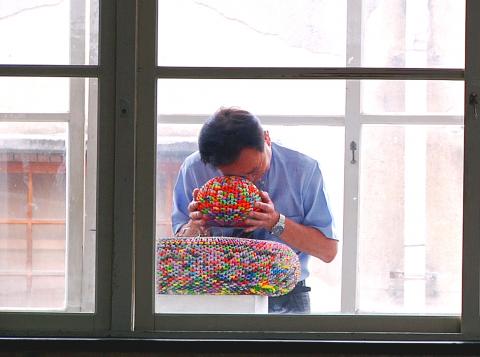As daylight wanes, a man quickens his pace through a forest. Following behind, his son, apparently annoyed, starts to howl. The father doesn’t pause, seemingly oblivious to the outburst. Soon, everything around them grows darker, enveloped in mist. Eventually, the father turns around, his voice heard off-screen confiding: “I can’t do it. [I want to] send him away. To stick a knife in him, to end it all.”
When director Shen Ko-shang (沈可尚) followed the two taking a walk that day, he knew he had captured something fundamental about the father’s love toward his grown child, who suffers from autism, a neural disorder which is characterized by speech difficulties and impaired social skills. The scene serves as the denouement of A Rolling Stone (築巢人), a poignant, haunting and fearlessly honest documentary that follows the lives of Chen Hung-tung (陳鴻棟), who is unmarried, and his 30-year-old son Chen Li-fu (陳立夫).
Through his lens, Shen takes a sober look at Chen Hung-tung’s repetitive, never-ending task of caring for his son, whose life revolves around soliloquizing, drawing bees, folding paper and collecting hives and any other object that might appeal to him. Chen senior is always shown by the side of his child as they walk through the city to find hives and bird nests or collect hermit crabs by the seashore. At home, he cooks for his husky son, who, unable to control his temper, often curses and even turns violent and aggressive toward his only caretaker.

Photo courtesy of Activator Marketing Company
Rather than appealing to the public with uplifting sentiment of parental devotion and perseverance, A Rolling Stone tackles a seldom, if ever, discussed aspect of real life, revealing a household filled not only with love, but fear, conflict, uncertainty and a longing to escape.
And the truth is not always easy to accept.
Chen Hung-tung, expecting a conventional documentary about how autistic children and their parents strive to enjoy life despite difficulties, was appalled when he first saw the finished work. The initial reaction from the Public Television Service (PTS, 公共電視台), which commissioned the film, was equally discouraging. It asked the director to remove Chen Hung-tung’s negative remarks about his son. Shen refused.

Photo courtesy of Activator Marketing Company
When a local film distributor showed interest in the film, which garnered top awards at home and abroad, Shen was surprised. Debate and criticism followed the film’s commercial release because it lacked the motivational punch that many were hoping to see. Now the thought of checking his Facebook page somewhat troubles the director, who spends hours every day replying to angry messages sent from parents of autistic children. They accuse him of ruining their effort to build a positive public image of people with autism.
“Most documentary programs in Taiwan look at the bright side of things, focusing on individuals doing good deeds or chasing their dreams. It is naturally unsettling to some when they see a work that diverges from that norm. I understand, and I think every bit of communication with others is important,” Shen told the Taipei Times.
“That’s probably the reason why I finally feel like a documentary filmmaker. Documentary filmmaking has impact and changes real life. And it won’t stop doing so after the work is finished. It is my responsibility to create a conversation.”

Photo courtesy of Activator Marketing Company
Documenting the small stuff
Shen began documentary filmmaking in 2000 with Silent Delta (噤聲三角), an experimental short intended as video art, which continues to be shown at museums and galleries across the globe. Among his more recent works, Baseball Boys (野球孩子, 2009) is a feature-length documentary about childhood as told through the story of a baseball team consisting of fifth and sixth graders, mostly Aboriginal boys, from Fuyuan Elementary School (富源國小) in Hualien County.
Shen says his documentaries usually concern “small matters, not relating to society,” and hence are far from the “noble” role of documentary filmmaking which attempts to express a point of view so as to affect change.
“I’m not noble. I don’t feel as though I have social responsibilities to fulfill. Nor do I particularly pay attention to morals. I was always immersed in my own art and nothing else,” he says.
This outsider sentiment changed after Shen completed Children from the Distant Planet (遙遠星球的孩子) in 2011, a four-part documentary discussing various issues surrounding autism that sought to increase the public’s understanding of the disorder.
It turned out to be a frustrating experience.
“With that series, I wanted to show how great [those with autism] are and that they deserve our love and respect. It was a rather awful thing to do. Arrogance hides behind this kind of warm appeal. The attitude was that I am doing a good deed for wanting to understand you who are not my equals,” the director confesses.
The right to interpret
Wanting to explore what is left untold, Shen turned to the Chens. This time, he sees, listens, observes but doesn’t try to explain. Throughout the film, we are never given any information other than what is shown on screen. We don’t know why there is no woman in the household or why the son was removed from care homes. Instead, the film guides us to focus on fragments of their daily life to reveal what Shen terms “the difficulty of loving.”
“The film never discusses autism. It shows you two individuals who are different from each other and how it is difficult for them to live together. The story is simple, but it is something that I wasn’t able to see until I learned to be humble,” Shen says.
With A Rolling Stone, Shen says his role has changed to that of an interpreter whose viewpoint constantly shifts and reshapes as his relationship with the father and son changes. At first he documented with a still camera, having no intention of participating in their lives. Then he switched to a small video camera, which needs to be secured on a tripod and thus has limited mobility.
“It means you have to rationally decide what you see without being influenced by others,” Shen says.
For Shen, getting up close and personal with the Chen’s forced him to ponder deeply the documentary filmmaker’s power to impact people’s lives and the responsibility that that power entails.
“We talked and talked, and the father finally agreed with what I did with the film. We are and will continue talking as the [final product] is just a part of the filmmaking process,” the director says.
The noble occupation
Shen’s effort is indeed a brave one when one thinks of the crowd-pleasing works that have become the mainstream of Taiwanese documentary cinema. Rock Me to the Moon (一首搖滾上月球), for example, is a documentary about children with rare diseases and their parents. But instead of focusing on their lives, it follows a group of fathers trying to perform at the Ho-Hai-Yan Gongliao Rock Festival. A box-office sensation, aerial photographer Chi Po-lin’s (齊柏林) Beyond Beauty: Taiwan From Above (看見台灣) reveals the consequences of wanton disregard for the environment in Taiwan, but dodges important questions such as who or what should be held accountable for the destruction and how we can correct the wrongs. In the end, the documentary resorts to cheap, patriotic emotions by showing a group of Aboriginal children waving a national flag on a mountain top.
Rosy and pleasant documentaries have their value, Shen says, but a documentary filmmaker should avoid pandering to the tastes of a mass audience.
“Taiwan is now in a marginalized position so it is understandable that we are in need of encouragement and want to feel good about ourselves. But it is dangerous when patriotic emotions become a pop cultural trend,” he says.
“Some things are best left to commercial television programs. Documentary filmmakers should always venture into territory where most people can’t or dare not go. That is what documentary film has taught me.”
A Rolling Stone is currently showing at Taipei’s Spot Huashan Cinema (光點華山電影館) and SBC International Cinema (SBC星橋國際影城) in Jhongli (中壢), Taoyuan County.

June 2 to June 8 Taiwan’s woodcutters believe that if they see even one speck of red in their cooked rice, no matter how small, an accident is going to happen. Peng Chin-tian (彭錦田) swears that this has proven to be true at every stop during his decades-long career in the logging industry. Along with mining, timber harvesting was once considered the most dangerous profession in Taiwan. Not only were mishaps common during all stages of processing, it was difficult to transport the injured to get medical treatment. Many died during the arduous journey. Peng recounts some of his accidents in

“Why does Taiwan identity decline?”a group of researchers lead by University of Nevada political scientist Austin Wang (王宏恩) asked in a recent paper. After all, it is not difficult to explain the rise in Taiwanese identity after the early 1990s. But no model predicted its decline during the 2016-2018 period, they say. After testing various alternative explanations, Wang et al argue that the fall-off in Taiwanese identity during that period is related to voter hedging based on the performance of the Democratic Progressive Party (DPP). Since the DPP is perceived as the guardian of Taiwan identity, when it performs well,

A short walk beneath the dense Amazon canopy, the forest abruptly opens up. Fallen logs are rotting, the trees grow sparser and the temperature rises in places sunlight hits the ground. This is what 24 years of severe drought looks like in the world’s largest rainforest. But this patch of degraded forest, about the size of a soccer field, is a scientific experiment. Launched in 2000 by Brazilian and British scientists, Esecaflor — short for “Forest Drought Study Project” in Portuguese — set out to simulate a future in which the changing climate could deplete the Amazon of rainfall. It is

The Taiwan People’s Party (TPP) on May 18 held a rally in Taichung to mark the anniversary of President William Lai’s (賴清德) inauguration on May 20. The title of the rally could be loosely translated to “May 18 recall fraudulent goods” (518退貨ㄌㄨㄚˋ!). Unlike in English, where the terms are the same, “recall” (退貨) in this context refers to product recalls due to damaged, defective or fraudulent merchandise, not the political recalls (罷免) currently dominating the headlines. I attended the rally to determine if the impression was correct that the TPP under party Chairman Huang Kuo-Chang (黃國昌) had little of a